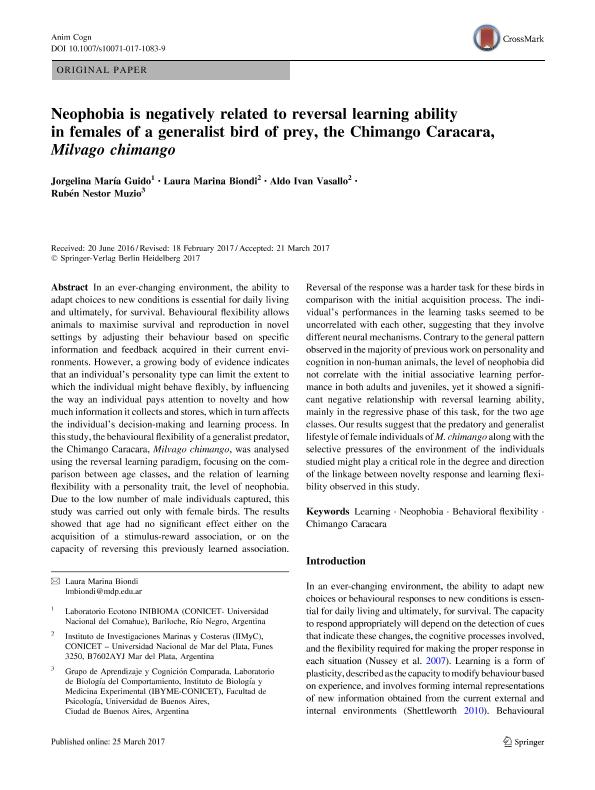Mostrar el registro sencillo del ítem
dc.contributor.author
Guido, Jorgelina María

dc.contributor.author
Biondi, Laura Marina

dc.contributor.author
Vassallo, Aldo Iván

dc.contributor.author
Muzio, Ruben Nestor

dc.date.available
2017-09-18T19:19:28Z
dc.date.issued
2017-03
dc.identifier.citation
Guido, Jorgelina María; Biondi, Laura Marina; Vassallo, Aldo Iván; Muzio, Ruben Nestor; Neophobia is negatively related to reversal learning ability in females of a generalist bird of prey, the Chimango Caracara, Milvago chimango; Springer; Animal Cognition; 20; 4; 3-2017; 591-602
dc.identifier.issn
1435-9448
dc.identifier.uri
http://hdl.handle.net/11336/24482
dc.description.abstract
In an ever-changing environment, the ability to adapt choices to new conditions is essential for daily living and ultimately, for survival. Behavioural flexibility allows animals to maximise survival and reproduction in novel settings by adjusting their behaviour based on specific information and feedback acquired in their current environments. However, a growing body of evidence indicates that an individual’s personality type can limit the extent to which the individual might behave flexibly, by influencing the way an individual pays attention to novelty and how much information it collects and stores, which in turn affects the individual’s decision-making and learning process. In this study, the behavioural flexibility of a generalist predator, the Chimango Caracara, Milvago chimango, was analysed using the reversal learning paradigm, focusing on the comparison between age classes, and the relation of learning flexibility with a personality trait, the level of neophobia. Due to the low number of male individuals captured, this study was carried out only with female birds. The results showed that age had no significant effect either on the acquisition of a stimulus-reward association, or on the capacity of reversing this previously learned association. Reversal of the response was a harder task for these birds in comparison with the initial acquisition process. The individual’s performances in the learning tasks seemed to be uncorrelated with each other, suggesting that they involve different neural mechanisms. Contrary to the general pattern observed in the majority of previous work on personality and cognition in non-human animals, the level of neophobia did not correlate with the initial associative learning performance in both adults and juveniles, yet it showed a significant negative relationship with reversal learning ability, mainly in the regressive phase of this task, for the two age classes. Our results suggest that the predatory and generalist lifestyle of female individuals of M. chimango along with the selective pressures of the environment of the individuals studied might play a critical role in the degree and direction of the linkage between novelty response and learning flexibility observed in this study.
dc.format
application/pdf
dc.language.iso
eng
dc.publisher
Springer

dc.rights
info:eu-repo/semantics/openAccess
dc.rights.uri
https://creativecommons.org/licenses/by-nc-sa/2.5/ar/
dc.subject
Learning
dc.subject
Neophobia
dc.subject
Behavioral Flexibility
dc.subject
Chimango Caracara
dc.subject.classification
Biología del Desarrollo

dc.subject.classification
Ciencias Biológicas

dc.subject.classification
CIENCIAS NATURALES Y EXACTAS

dc.subject.classification
Otras Psicología

dc.subject.classification
Psicología

dc.subject.classification
CIENCIAS SOCIALES

dc.title
Neophobia is negatively related to reversal learning ability in females of a generalist bird of prey, the Chimango Caracara, Milvago chimango
dc.type
info:eu-repo/semantics/article
dc.type
info:ar-repo/semantics/artículo
dc.type
info:eu-repo/semantics/publishedVersion
dc.date.updated
2017-09-08T20:18:51Z
dc.identifier.eissn
1435-9456
dc.journal.volume
20
dc.journal.number
4
dc.journal.pagination
591-602
dc.journal.pais
Alemania

dc.journal.ciudad
Berlín
dc.description.fil
Fil: Guido, Jorgelina María. Consejo Nacional de Investigaciones Científicas y Técnicas. Centro Científico Tecnológico Conicet - Patagonia Norte. Instituto de Investigaciones en Biodiversidad y Medioambiente. Universidad Nacional del Comahue. Centro Regional Universidad Bariloche. Instituto de Investigaciones en Biodiversidad y Medioambiente; Argentina
dc.description.fil
Fil: Biondi, Laura Marina. Consejo Nacional de Investigaciones Científicas y Técnicas. Centro Científico Tecnológico Conicet - Mar del Plata. Instituto de Investigaciones Marinas y Costeras. Universidad Nacional de Mar del Plata. Facultad de Ciencia Exactas y Naturales. Instituto de Investigaciones Marinas y Costeras; Argentina
dc.description.fil
Fil: Vassallo, Aldo Iván. Consejo Nacional de Investigaciones Científicas y Técnicas. Centro Científico Tecnológico Conicet - Mar del Plata. Instituto de Investigaciones Marinas y Costeras. Universidad Nacional de Mar del Plata. Facultad de Ciencia Exactas y Naturales. Instituto de Investigaciones Marinas y Costeras; Argentina
dc.description.fil
Fil: Muzio, Ruben Nestor. Consejo Nacional de Investigaciones Científicas y Técnicas. Instituto de Biología y Medicina Experimental. Fundación de Instituto de Biología y Medicina Experimental. Instituto de Biología y Medicina Experimental; Argentina
dc.journal.title
Animal Cognition

dc.relation.alternativeid
info:eu-repo/semantics/altIdentifier/url/https://link.springer.com/article/10.1007%2Fs10071-017-1083-9
dc.relation.alternativeid
info:eu-repo/semantics/altIdentifier/doi/http://dx.doi.org/10.1007/s10071-017-1083-9
Archivos asociados
